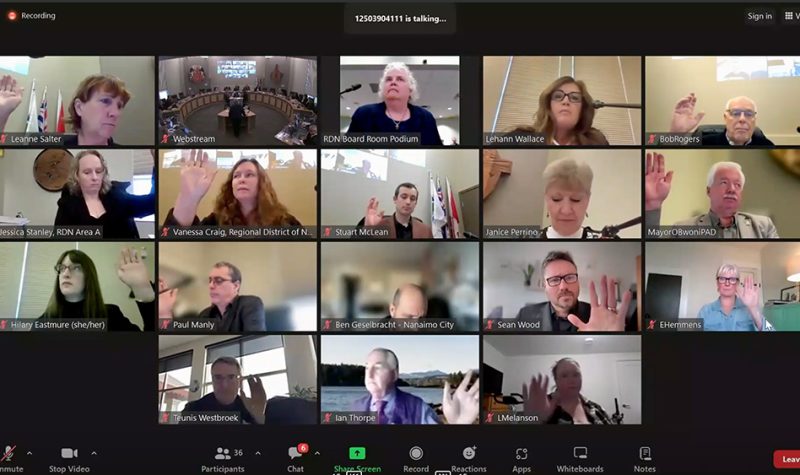A bylaw by the Regional District of Nanaimo to establish a community health and wellbeing service for Gabriola Island is going to an Alternative Approval Process to get the consent of Gabriolans to fund the estimated $103,000 needed to hire a full-time coordinator.
Dyan Dunsmoor-Farley, a spokesperson for the Gabriola Health and Wellness Collaborative, says that there is a misconception that everyone who lives in the Gulf Islands is affluent.
“A lot of folks think of Gulf Islands as the sort of place where wealthy people go and buy homes, and certainly there's wealthy people in our community, but we have a very high incidence of low income individuals, seniors and families,” she said. “At the last census, we had almost 40 per cent of our children living in poverty.”
Dunsmoor-Farley said that toxic drugs are also taking their toll on the island community.
“We've had several individuals die of tainted drugs in the last year,” she said. “It's not an unusual thing. In our school, in our elementary classes, two children had lost parents, and one child had lost two parents.”
Dunsmoor-Farley says the Health and Wellness Collaborative is a network of over 50 health and wellness groups on the island that work together to try and find solutions for the problems the island is facing.
“These are really significant problems for a small community to tackle,” she said. “So it's really important to us that we're able to pull together as a community to figure out the solutions to these issues.”
Vanessa Craig, director for Gabriola, Mudge and De Courcy Islands at the Regional District of Nanaimo, says the paid position is needed as the volunteers for the Health and Wellness Collaborative are burning out.
“Although some of the staff have a paid position, they are heavily reliant on volunteers to deliver the services,” she said. “And so what I was hearing from these groups is that they want to work and support the community, but they're starting to reach a level of burnout for volunteer burnout.”
Craig says that she expects the coordinator will take on some of the administrative work, such as coordinating monthly meetings of the collaborative and applying for grants.
RDN director and Nanaimo city councillor Sheryl Armstrong was the lone vote of opposition at the RDN meeting on Nov. 14, saying that she doesn’t believe that the project is essential.
“I don't believe that $100,000 is good spending for somebody to coordinate,” she told CHLY on Monday. “I think that's a lot of money. I think it should go to a public referendum for something like that, because I don't believe that position is necessary.”
Craig says that she respects Armstrong’s opinion but disagrees with the claim that the coordinator will just organize meetings.
“I guess that kind of goes to part of why we're going through this process is the same assumption that this stuff will get done anyway,” she said. ‘Well, the reason these things are getting done is because it's being done by volunteers and what I'm hearing from the volunteers is that they would like some support, so they can focus on doing the work that helps the communities and not necessarily all of the administration.”
Armstrong says that she thinks the service should be funded by the province.
“I believe social planning belongs with the province like housing, homelessness, those are provincial mandates, health is provincial mandate,” she said. “And the more that we keep accepting these downloads, the less dollars we have to work on infrastructure, parks, recreation, support staff, police, fire and waste.”
The maximum property tax rate in the proposed bylaw is just under four cents per $1,000 of a property’s assessed value. The average residential property on Gabriola Island in 2022 was worth $842,000 according to BC Assessment, which would put the average tax increase at roughly $32.75 per year.
However, according to RDN director Vanessa Craig the tax revenue will be capped at roughly $50,000 in 2024 as the pilot project is for a part-time position.
The exact tax increase will be part of the RDN’s 2024 budget if the AAP is approved.
Dunsmoor-Farley says that she understands people’s concerns about raising property taxes.
“I am not insensitive to the fact that for some people, this is a big ask,” she said. “But I would ask everybody to think about the fact that our ability to support those most in need is only going to increase by doing this.”
At least 10 per cent of eligible voters on Gabriola Island, or 392 people, will have until 4 p.m. on February 20th to fill out a form stating their opposition to the plan. If this threshold is reached the bylaw would have to be approved in a referendum vote.
Voters will be able to submit the AAP form by email, mail, fax and in person at the RDN building in Nanaimo.
Listen to CHLY’s story below:


